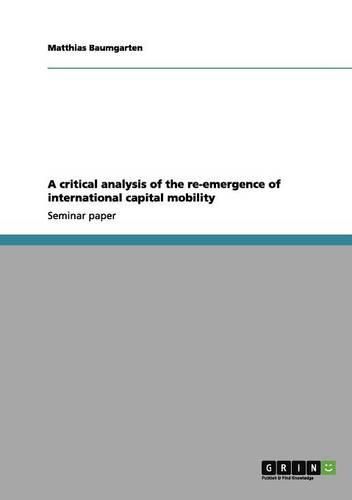Readings Newsletter
Become a Readings Member to make your shopping experience even easier.
Sign in or sign up for free!
You’re not far away from qualifying for FREE standard shipping within Australia
You’ve qualified for FREE standard shipping within Australia
The cart is loading…






Seminar paper from the year 2011 in the subject Economics - Finance, grade: 1.0 (83 %), University of Warwick (Politics and International Studies), language: English, abstract: From the days of the Bretton Woods Agreements to the beginning of the subprime crisis, the world witnessed an impressive resurrection of global finance and with it the re-emergence of international capital mobility (ICM). But the phenomenon of ICM is a contested issue among commentators. While some almost go as far as denying its existence, the most widespread discourse portrays ICM as a powerful external force, putting pressure on the state to adopt capital-friendly policies and reduce welfare expenditures. This notion of forced competition among states is manifested in the capital mobility hypothesis, which draws a parallel between the rise of ICM and its structural power to constrain the state. The following essay argues that this functional connection is not necessarily given, as the mobility of capital is derived from technical, financial and regulatory sources, while its power originates from discursive mechanisms. By looking at historical developments, it is shown that ICM did indeed re-emerge. But a close examination of the constraints it poses on the different categories of the state reveals that the latter retains significant room to move. To understand where the premise of the capital mobility hypothesis comes from, ICM is analyzed through discursive institutionalism. A number of relevant discourses are examined and it is concluded that the state itself plays a substantial role in creating and maintaining the idea of ICM’s power.
$9.00 standard shipping within Australia
FREE standard shipping within Australia for orders over $100.00
Express & International shipping calculated at checkout
Seminar paper from the year 2011 in the subject Economics - Finance, grade: 1.0 (83 %), University of Warwick (Politics and International Studies), language: English, abstract: From the days of the Bretton Woods Agreements to the beginning of the subprime crisis, the world witnessed an impressive resurrection of global finance and with it the re-emergence of international capital mobility (ICM). But the phenomenon of ICM is a contested issue among commentators. While some almost go as far as denying its existence, the most widespread discourse portrays ICM as a powerful external force, putting pressure on the state to adopt capital-friendly policies and reduce welfare expenditures. This notion of forced competition among states is manifested in the capital mobility hypothesis, which draws a parallel between the rise of ICM and its structural power to constrain the state. The following essay argues that this functional connection is not necessarily given, as the mobility of capital is derived from technical, financial and regulatory sources, while its power originates from discursive mechanisms. By looking at historical developments, it is shown that ICM did indeed re-emerge. But a close examination of the constraints it poses on the different categories of the state reveals that the latter retains significant room to move. To understand where the premise of the capital mobility hypothesis comes from, ICM is analyzed through discursive institutionalism. A number of relevant discourses are examined and it is concluded that the state itself plays a substantial role in creating and maintaining the idea of ICM’s power.